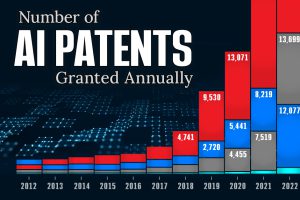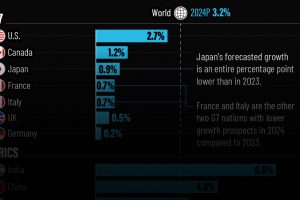Tesla is the World’s 4th Largest Automaker by Value
This is despite only delivering 76,230 vehicles in 2016.
The Chart of the Week is a weekly Visual Capitalist feature on Fridays.
It’s been another breakout year for Tesla.
Over the course of 2017, the company’s market capitalization has soared beyond those of major manufacturers like Ford, GM, BMW, Honda, and Nissan. This thrust can be partly attributed to the company’s Model S, which reigns supreme as the top-selling plug-in electric car worldwide in 2015 and 2016.
But more importantly for Tesla, this massive momentum is based on the company’s much-anticipated future performance. Investors and analysts eagerly anticipate progress as the company ramps up production of the more affordable Model 3, and many also strongly believe that Elon Musk brings an “X Factor” that could translate into future returns.
In today’s charts, we look at Tesla’s ascent in valuation to become the #4 ranked automaker globally, and also the #1 maker in America. We also show why the value assigned to Tesla’s astonishing valuation may be premature, at least based on conventional metrics.
Tesla’s Rapid Ascent
In the opening months of 2013, Tesla was just starting to plan deliveries for its Model S. At the time, the company was worth a mere $3.9 billion – just 7% of the value of Ford.
Since then, Tesla’s value has skyrocketed to make it the most valued auto company in North America:

Despite only producing 76,230 vehicles in 2016, Tesla is now the biggest of the “Big 3” – and this puts a lot of pressure on the company to live up to the vast expectations held by investors and media.
The Speculator’s Gambit
With so much hype and value assigned to expectations of future performance, Tesla and its enthusiastic investors are in a potentially tough spot.
Even though it is the most valued car company in the United States, Tesla is much less impressive by more conventional metrics:

The company has just a fraction of the employees, vehicle deliveries, and revenue of its competitors. Tesla also treads a similar path to Amazon, in that it will likely take a while for the company to ever post a profit.
Here’s another look, this time showing Tesla’s metrics as a percentage of GM’s:
| Metric | Tesla | GM | Tesla (as a % of GM) |
|---|---|---|---|
| Employees (2016) | 17,800 | 225,000 | 7.9% |
| Vehicle Deliveries (2016) | 76,000 | 10,000,000 | 0.8% |
| Revenue (2016) | $7.0B | $166.4B | 4.2% |
| Profit (2016) | -$0.8B | $9.4B | n/a |
Tesla is producing less than 1% as many cars as GM, but is worth more in market value.
That’s not to say that Tesla will not ultimately live up to expectations – but it does put into perspective the risk of banking on these future returns.





